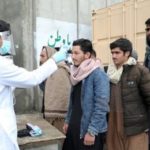A new United Nations report released on Thursday said that the sustained and effective efforts in fighting corruption in Afghanistan remain critical for the country’s future.
“Anti-corruption efforts and integrity reforms must be key priorities for Afghanistan’s leadership, especially so given the country’s pressing challenges and opportunities around peace and development,” said Deborah Lyons, the UN Secretary-General’s Special Representative for Afghanistan.
“Addressing the COVID-19 crisis and building a peaceful, healthy and prosperous Afghanistan requires integrity and accountability – fundamental principles for the future of any nation.”
UNAMA’s fourth annual anti-corruption report, titled “Afghanistan’s Fight against Corruption: Crucial for Peace and Prosperity,” reviews the progress Afghanistan has made in anti-corruption reform and provides analysis and recommendations to support Afghanistan’s institutions in combatting corruption to “improve the lives of all citizens who must grapple each day with the issue.”
The report describes how anti-corruption reforms slowed in 2019, with fewer legislative and strategic initiatives undertaken to fight corruption than in previous years.
The report outlines how Afghanistan’s 2017 anti-corruption strategy was a “temporary policy document,” and a new one has not been developed.
In addition, the report notes, the institutional gaps left by “stalled progress in both strategy and implementation” were not filled by the expected establishment of an independent anti-corruption commission.
The report makes several recommendations to Afghanistan’s government, recognizing that its “previous anti-corruption efforts had yet to positively impact the lives of most Afghans,” and concludes that, “notwithstanding the many legal and policy reforms that have been undertaken, corruption remains one of the most significant obstacles to Afghanistan’s long-term peace and prosperity.”
The report also acknowledges notable areas of progress, such as the Anti-Corruption Justice Center enhancing its ability to prosecute and adjudicate high-level corruption cases.
The report recommends that the government “develop a realistic long-term strategy that builds on past achievements; that the anti-corruption commission is swiftly established; that the law-enforcement capacity dedicated to corruption investigations and related arrests be boosted; that oversight and management of public resources be strengthened; and that justice sector reforms be prioritized by fostering judicial independence.”











